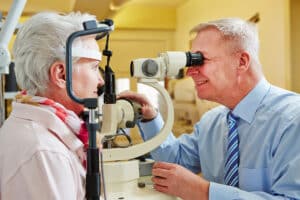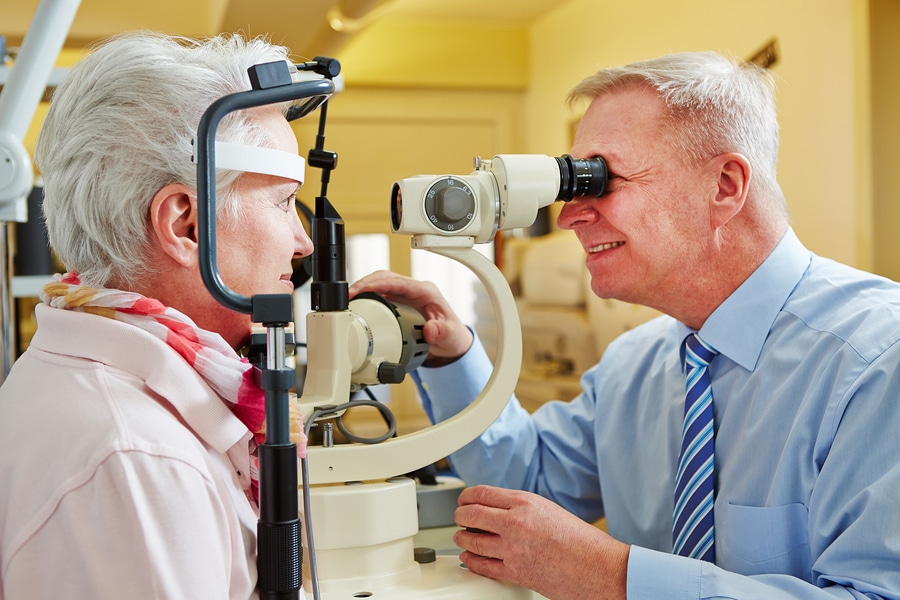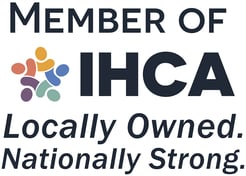Macular degeneration is one of the leading causes of vision loss for people over 50, yet many seniors have limited knowledge about this condition until they receive a diagnosis. This can change with elder care providers by their side, pointing seniors in the right direction to find resources and support, as well as encouraging them to talk with their healthcare team about their concerns.
What Is Macular Degeneration?
Age-related macular degeneration (AMD) is a degenerative eye disease that affects the macula, the central part of the retina responsible for sharp, detailed vision. When the macula deteriorates, it impacts the ability to see fine details, recognize faces, read, drive, and perform other activities requiring central vision. Peripheral (side) vision typically remains intact.
Types of Macular Degeneration
There are two main types of AMD:
Dry AMD: Accounting for about 85-90% of cases, dry AMD occurs when small yellow deposits called drusen form under the retina. It typically progresses slowly over several years.
Wet AMD: Less common but more severe, wet AMD develops when abnormal blood vessels grow under the retina and leak fluid and blood. Vision loss can occur rapidly, sometimes within days or weeks.
Risk Factors
Along with pointing seniors in the right direction to find resources about macular degeneration, elder care can also help them learn about risk factors, which include the following:
Age: The risk increases significantly after age 60
Family History: Having a parent or sibling with AMD
Smoking: Current smokers have 2-3 times higher risk
Race: Caucasians have higher rates than other ethnicities
Cardiovascular Disease: Heart disease and high blood pressure correlate with increased risk
Diet: Low intake of antioxidants and omega-3 fatty acids
Warning Signs and Symptoms
Early detection is crucial for managing macular degeneration effectively. Elder care can encourage seniors to be alert for these warning signs:
- Blurry or distorted central vision
- Difficulty reading without extra light or magnification
- Colors appear less vibrant
- Straight lines appear wavy or bent
- A dark or empty spot in the center of your vision
- Difficulty recognizing faces
Screening and Diagnosis
Regular eye exams are essential, especially after age 50. The eye doctor may perform several tests:
- Visual acuity test (reading an eye chart)
- Dilated eye exam to view the retina
- Amsler grid test to detect vision distortions
- Optical coherence tomography (OCT) to create detailed images of retinal layers
- Fluorescein angiography to examine blood vessels in the retina
Treatment Options
While there’s no cure for macular degeneration, several treatments can slow progression and sometimes improve vision. For dry AMD, AREDS2 vitamin supplements and lifestyle modifications such as quitting smoking and eating a nutrient-rich diet are key. For wet AMD, anti-VEGF injections that reduce abnormal blood vessel growth may be encouraged, as well as photodynamic therapy using light-activated medications. Additionally, laser therapy might be considered in certain cases.
Prevention Strategies
While some risk factors like age and genetics can’t be changed, elder care can encourage seniors to take proactive steps:
- Protect their eyes from UV light with sunglasses
- Maintain a healthy blood pressure and cholesterol level
- Eat a diet rich in leafy greens, fish, and colorful fruits and vegetables
- Exercise regularly
- Don’t smoke (or quit if they do)
- Get regular eye exams

Elder care plays a key role in helping seniors understand macular degeneration and empowering them to seek early intervention, as well as explore the many resources available to maintain quality of life and independence. Ultimately, by recognizing symptoms early and working closely with eye care professionals, they can take control of their eye health and adapt successfully to vision changes.
Sources: https://my.clevelandclinic.org/health/diseases/15246-macular-degeneration
https://www.aao.org/eye-health/diseases/amd-macular-degeneration#:~:text=Dry%20AMD%20is%20when%20parts,Age%2DRelated%20Macular%20Degeneration%20Diagnosis
If you or an aging loved one are considering Elder Care Services in Hendersonville, TN, please get in touch with the caring staff at Senior Solutions Home Care. (615) 307-4509
Senior Solutions Home Care is a Trusted Home Care Agency serving Nashville, Brentwood, Nolensville, Gallatin, Hendersonville, Smyrna, Murfreesboro, Mount Juliet, Lebanon, Goodlettsville, Davidson County, and surrounding areas.
Over the years, we have expanded, providing service in all 95 counties throughout Tennessee, and we now have a growing presence in Georgia.
Senior Solutions is recognized as a top 5% independent agency and a three-time Inc. 5000 honoree in 2018, 2019, and 2020. These types of awards matter to us because they show growth in our goal of eventually touching a million lives. We’re excited to continue that growth and to touch even more families with our commitment to quality care!
- What Seniors Need to Know About Macular Degeneration - May 23, 2025
- Risk Factors of Lung Cancer - May 8, 2025
- Keeping Your Elderly Loved One Safe on the Road - April 23, 2025




